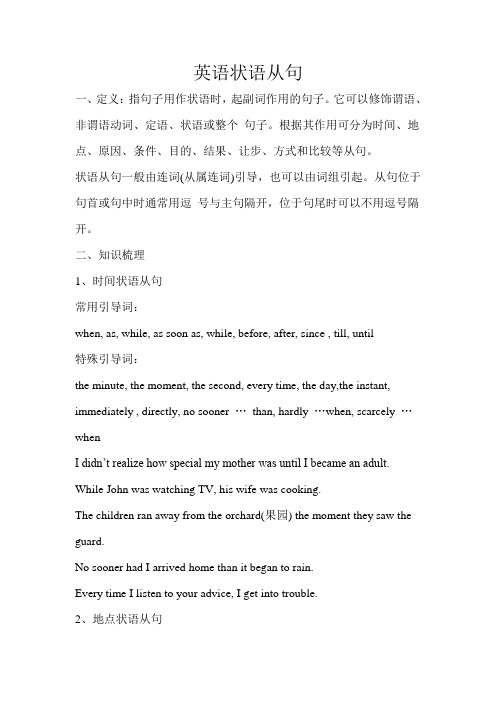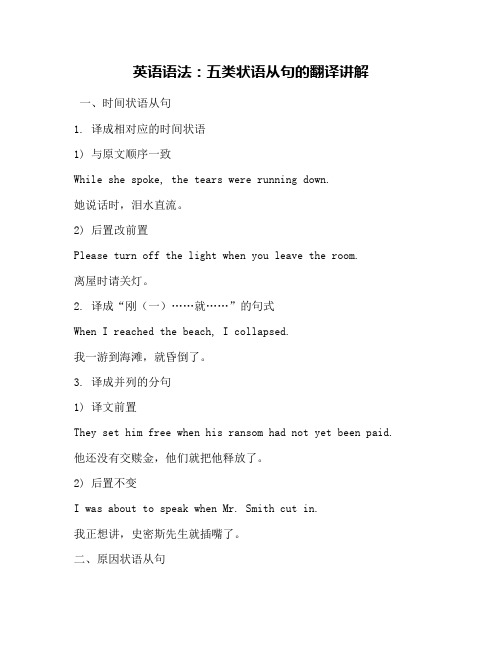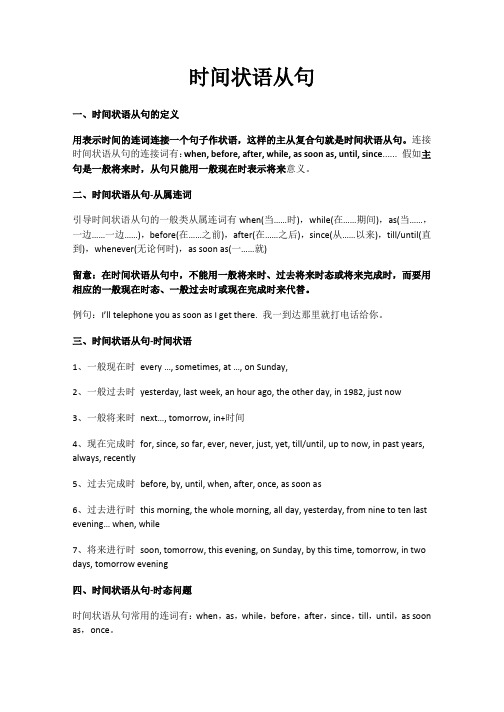语法 状语从句讲解
英语语法讲解之状语从句

英语状语从句一、定义:指句子用作状语时,起副词作用的句子。
它可以修饰谓语、非谓语动词、定语、状语或整个句子。
根据其作用可分为时间、地点、原因、条件、目的、结果、让步、方式和比较等从句。
状语从句一般由连词(从属连词)引导,也可以由词组引起。
从句位于句首或句中时通常用逗号与主句隔开,位于句尾时可以不用逗号隔开。
二、知识梳理1、时间状语从句常用引导词:when, as, while, as soon as, while, before, after, since , till, until特殊引导词:the minute, the moment, the second, every time, the day,the instant, immediately , directly, no sooner …than, hardly …when, scarcely …whenI didn’t realize how special my mother was until I became an adult. While John was watching TV, his wife was cooking.The children ran away from the orchard(果园) the moment they saw the guard.No sooner had I arrived home than it began to rain.Every time I listen to your advice, I get into trouble.2、地点状语从句常用引导词:where特殊引导词:wherever, anywhere, everywhereGenerally, air will be heavily polluted where there are factories. Wherever you go, you should work hard.3、原因状语从句常用引导词:because, since, as, for特殊引导词:seeing that, now that, in that, considering that, given that, considering that, as much as, so much asMy friends dislike me because I’m handsome and successful.Now that everybody has come, let’s begin our conference.The higher income tax is harmful in that it may discourage people from trying to earn more.Considering that he is no more than 12 years old, his height of 1.80 m is quite remarkable.4、目的状语从句常用引导词:so that, in order that特殊引导词:lest, in case, for fear that,in the hope that, for the purpose that, to the end thatThe boss asked the secretary to hurry up with the letters so that he could sign them.The teacher raised his voice on purpose that the students in the back could hear more clearly.5、结果状语从句常用引导词:so that, so…that, such …that,特殊引导词:such that, to the degree that, to the extent that, to such a degree that,He got up so early that he caught the first bus.It’s such a good chance that we must not miss it.To such an degree was he excited that he couldn’t sleep last night.6、条件状语从句常用引导词:if, unless,特殊引导词:as/so long as, only if, providing/provided that, suppose that, in case that, on condition thatWe’ll start our project if the president agrees.You will certainly succeed so long as you keep on trying.Provided that there is no opposition, we shall hold the meeting here.7、让步状语从句常用引导词:though, although, even if, even though特殊引导词:as(用在让步状语从句中必须要倒装),while ( 一般用在句首),no matter …, in spite of the fact that, while, whatever, whoever, wherever, whenever, however, whicheverMuch as I respect hi m, I can’t agree to his proposal.尽管我很尊敬他, 我却不同意他的建议。
英语语法:五类状语从句的翻译讲解

英语语法:五类状语从句的翻译讲解一、时间状语从句1. 译成相对应的时间状语1) 与原文顺序一致While she spoke, the tears were running down.她说话时,泪水直流。
2) 后置改前置Please turn off the light when you leave the room.离屋时请关灯。
2. 译成“刚(一)……就……”的句式When I reached the beach, I collapsed.我一游到海滩,就昏倒了。
3. 译成并列的分句1) 译文前置They set him free when his ransom had not yet been paid.他还没有交赎金,他们就把他释放了。
2) 后置不变I was about to speak when Mr. Smith cut in.我正想讲,史密斯先生就插嘴了。
二、原因状语从句1. 译成表“因”的分句1) “因”在“果”之前The crops failed because the season was dry.因为气候干旱,作物歉收。
2) “果”在“因”之前She could get away with anything, because she looked such a baby.她能渡过任何风险,因为她看上去简直还像娃娃模样。
2. 译成因果偏正复句中的主句Pure iron is not used in industry because it is too soft.纯铁太软,所以不用在工业上。
Because he was convinced of the accuracy of this fact, he stuck to his opinion.他深信这件事准确可靠,所以坚持己见。
3. 译成无关联词的因果关系并列分句Where there is sound, there must be sound waves.哪里有声音,哪里就必有声波。
高中英语语法时间状语从句讲解

时间状语从句一、时间状语从句的定义用表示时间的连词连接一个句子作状语,这样的主从复合句就是时间状语从句。
连接时间状语从句的连接词有:when, before, after, while, as soon as, until, since...... 假如主句是一般将来时,从句只能用一般现在时表示将来意义。
二、时间状语从句-从属连词引导时间状语从句的一般类从属连词有when(当……时),while(在……期间),as(当……,一边……一边……),before(在……之前),after(在……之后),since(从……以来),till/until(直到),whenever(无论何时),as soon as(一……就)留意:在时间状语从句中,不能用一般将来时、过去将来时态或将来完成时,而要用相应的一般现在时态、一般过去时或现在完成时来代替。
例句:I’ll telephone you as soon as I get there. 我一到达那里就打电话给你。
三、时间状语从句-时间状语1、一般现在时every …, sometimes, at …, on Sunday,2、一般过去时yesterday, last week, an hour ago, the other day, in 1982, just now3、一般将来时next…, tomorrow, in+时间4、现在完成时for, since, so far, ever, never, just, yet, till/until, up to now, in past years, always, recently5、过去完成时before, by, until, when, after, once, as soon as6、过去进行时this morning, the whole morning, all day, yesterday, from nine to ten last evening… when, while7、将来进行时soon, tomorrow, this evening, on Sunday, by this time, tomorrow, in two days, tomorrow evening四、时间状语从句-时态问题时间状语从句常用的连词有:when,as,while,before,after,since,till,until,as soon as,once。
原因状语从句语法讲解

原因状语从句语法讲解以下是原因状语从句的语法讲解:1.引导词:原因状语从句通常由以下引导词引导:- because(因为)- since(因为,自从)- as(因为,既然)- as a result of(由于)- due to(由于)- owing to(由于)- now that(既然)2.引导词用法:- because和since通常表示明显的原因,语义上较强,可以置于句首或句尾。
例如:He is crying because he lost his toy.(他哭了,因为他丢了他的玩具。
)- as表示理由,常不置于句首,一般位于句中或句尾。
例如:Helikes soccer as he enjoys playing with his friends.(他喜欢足球,因为他喜欢和朋友一起玩。
)- as a result of、due to、owing to表示结果或原因,一般置于句首。
例如:As a result of the rain, the game was canceled.(由于下雨,比赛被取消了。
)- now that表示既然,常置于句首。
例如:Now that you have finished your homework, you can go out and play.(既然你已经做完作业了,你可以出去玩了。
)3.句子结构:- 原因状语从句通常由主语、谓语和宾语等组成,可以包含其他从句。
例如:He is sad because he failed the test yesterday.(他因为昨天考试没及格而感到难过。
)- 状语从句的主谓结构与主句的一致。
例如:I can't go to the park because it is raining.(因为正在下雨,所以我不能去公园。
)。
状语及状语从句(语法加练习完整讲解).ppt

4.动词不定式(或不定式短语): He went to see a film .他看电影去了。 My father was surprised to hear the news . 我父亲听到这个消息,感到惊奇。
5.分词(短语): He sat there reading a novel . 他坐在那儿看小说。 The students went away laughing. 学生们笑着走开了。
2023最新整理收集 do something
The Adverbial 状语
ห้องสมุดไป่ตู้ 一、什么是状语
修饰动词、形容词 、副词或整个句子 ,说明 动作或 状态特征的句子成分,叫做 状语。
1. 状语修饰动词 Silently she went away. 她悄悄地走开了。
2. 状语修饰句子 Sadly, he will not be there. 令人伤心的是,他将不会在那里了。
The Adverbial Clauses 状语从句
从状种九
时间状语从句 地点状语从句 原因状语从句 条件状语从句 让步状语从句 结果状语从句 目的状语从句 方式状语从句 比较状语从句
时间状语从句
I will discuss this with you when we meet. 我们见面时再与你讨论这件事。
(2)如果动词前有一个或几个助动词,状语位于第一个 助动词之后。 He has already had his lunch .他已吃过午饭了。
(3)如果动词是 be,状语就放在 be动词之后。 He is always at home. 他总是在家。
3.状语位于句末,这是状语的通常位置。 We get up at six in the morning . 我们早晨六点起床。
中考英语语法之状语从句 )(共23张PPT)

八、让步状语从句 定义:让步状语从句,是指状语从句中的一种,其本身也是状语从句。一般翻译为“尽管……”或 “即使……”,就是我们日常生活中用的“退一步说…”的感觉。 //引导词// though/although/as(虽然,尽管) even if/though(即使,尽管) whether/no matter whether...or(not)(不管...是否,不管是...还是) //注意// 1. though, although,as的区别 A. though, although的主句中可以用 yet, still, nevertheless,但不可使用but。 B. though引导的从句可以倒装,也可以不倒装; as引导的从句必须倒装; although引导的从句不能倒装。
as 1. 表示“当...时候”,强调同时发生,不指先后。 2. 说明两种正在发展或变化的情况,表示“随着”,表示时间的推移。 3. 表示“一边...一边...”。 4. 强调两个动作紧接着发生。 5. 表示“虽然,尽管”。 6. 其他含义“正如,正像”,“作为”,“由于,因为”
before 1. 一般意为“在...之前” “...才”,“...就” “还没有...”“免得”“不知不觉” “宁可,宁愿”,“否则,要不然”。
//注意// for也可以表示原因,属并列连词,但不是说明直接原因,而是对某种情况加以 推断,用于表示补充说明理由。
三、地点状语从句 定义:地点状语从句表示地点、 方位。 引导词:where, wherever 1. 地点状语从句由where, wherever引导。 //注意// where与wherever的区别:where表特定的地点,而wherever表示非特定的地点。 wherever=to/at any place where 2. 地点状语从句与定语从句的区别 where引导定语从句时,从句前应有一个表示地点的名词作先行词; 而状语从句前则无先行词。
英语语法:五类状语从句的翻译讲解
【导语】状语从句(AdverbialClause)状语从句指句⼦⽤作状语时,起副词作⽤的句⼦。
它可以修饰谓语、⾮谓语动词、定语、状语或整个句⼦。
根据其作⽤可分为时间、地点、原因、条件、⽬的、结果、让步、⽅式和⽐较等从句。
状语从句⼀般由连词(从属连词)引导,也可以由词组引起。
从句位于句⾸或句中时通常⽤逗号与主句隔开,位于句尾时可以不⽤逗号隔开。
以下内容由©⽆忧考⽹整理发布,欢迎阅读参考!更多相关讯息请关注©⽆忧考⽹!⼀、时间状语从句1. 译成相应的时间状语1) 与原⽂顺序⼀致While she spoke, the tears were running down.她说话时,泪⽔直流。
2) 后置改前置Please turn off the light when you leave the room.离屋时请关灯。
2. 译成“刚(⼀)……就……”的句式When I reached the beach, I collapsed.我⼀游到海滩,就昏倒了。
3. 译成并列的分句1) 译⽂前置They set him free when his ransom had not yet been paid.他还没有交赎⾦,他们就把他释放了。
2) 后置不变I was about to speak when Mr. Smith cut in.我正想讲,史密斯先⽣就插嘴了。
⼆、原因状语从句1. 译成表“因”的分句1) “因”在“果”之前The crops failed because the season was dry.因为⽓候⼲旱,作物歉收。
2) “果”在“因”之前She could get away with anything, because she looked such a baby.她能渡过任何风险,因为她看上去简直还像娃娃模样。
2. 译成因果偏正复句中的主句Pure iron is not used in industry because it is too soft.纯铁太软,所以不⽤在⼯业上。
英语语法讲解课件-状语从句课件
I will leave if he comes.
The train had been away when I arrived.
过去配过去
过去配过去
现在配现在
现在配现在
前引:根据主从句的三种时间关系,分为主 从句同时发生、主从句都没有发生、主从句一前一后发生三类句型, 每种句型分别对应独特的句式
地点状语从句 引导地点状语从句的主要有:where, wherever及- where构成的复合词。
We shall go where people are kind.
We received a warm welcome everywhere we arrived. 我们每到一个地方都受到了热烈的欢迎。
01
02
03
条件状语从句 最常用的引导词有: if, if only(if 的强调式), unless (= if not), as long as, so long as
1
E.G.
2
As long as I live, I shall work hard.
3
You can’t learn it well unless you work hard.
E.G. When/As he was eating his breakfast, he heard the door bell ring. While I was reading, he was playing. The mother didn't go to bed until her little daughter returned home last night. 昨晚母亲等到她的小女儿回家才睡觉。
英语语法状语从句时间状语从句讲解教案
英语语法状语从句时间状语从句讲解教案引言:本教案将详细讲解英语语法中的状语从句,以及特别关注于时间状语从句的用法和使用技巧。
通过本教案的学习,学生将能够更好地理解和运用时间状语从句,提高自己的英语语法水平。
一、状语从句概述状语从句是一个从句,用来作为句子的状语,对句子的主句进行修饰或者限制。
它可以用来表达时间、地点、原因、条件等多种语义。
本教案主要聚焦于时间状语从句的使用。
二、时间状语从句的引导词时间状语从句通常由引导词引导,以下是常用的引导词:1. when:当...的时候,表示某一特定事件发生的时间点;2. while:当...的时候,表示主句和从句两个事件同时进行;3. before:在...之前,表示主句的动作发生在从句之前;4. after:在...之后,表示主句的动作发生在从句之后;5. as soon as:一...就,表示主句的动作紧接着从句的动作;6. until/till:直到...为止,表示主句的动作一直持续到从句的动作发生。
三、时间状语从句的结构和用法1. 结构:时间状语从句的结构是从句+主句。
从句使用引导词引导,主句是完整的句子。
2. 用法:时间状语从句的作用是描述主句中的动作发生的时间或者顺序。
时间状语从句可以置于主句之前或之后,具体位置要根据语境和语义要求来确定。
四、时间状语从句的例子和练习以下是一些时间状语从句的例子,通过练习来加深学生对时间状语从句的理解和运用。
1. When she arrived, we had already finished our dinner.(当她到达时,我们已经吃完晚饭了。
)2. I will go to bed as soon as I finish this book.(我一读完这本书就去睡觉。
)3. He didn't go to school until he was seven years old.(直到他七岁时他才上学。
高中英语2025届高考语法复习状语从句知识讲解
高考英语语法复习状语从句知识讲解一、概述常见的有although/though/even though引导的让步状语从句。
if/unless引导的条件状语从句。
until/when/while/as soon as引导的时间状语从句。
because引导的原因状语从句,so that引导的目的状语从句等。
if引导的条件状语从句和when引导的时间状语从句一般都会和时态相结合,即主要考查“主将从现”原则。
对于状语从句的学习可与专题六从属连词相结合。
在时间状语从句和条件状语从句中,主句和从句的时态一致问题一般有两种情况:(1)“主将从现”:主句用一般将来时,而从句用一般现在时。
常见的使用“主将从现”原则的连词有:表示时间的when, while, after, before, until, till, whenever, as soon as, as long as, once 等;表示条件的if, unless, so long as, in case等。
(2)“主祈从现”:若主句是祈使句,或主句中有情态动词时,那么从句用一般现在时表示将来。
(3)“主情从现”:若主句有情态动词, 那么从句用一般现在时表示将来。
如:You can get good grades if you study hard.如果你努力学习,你将取得好成绩。
状语从句由从属连词引导,与主句连接,位于句首时,常用逗号与主句分开,位于句末时,其前一般不用逗号。
状语从句根据其用途可分为时间状语从句、条件状语从句、原因状语从句、目的状语从句、结果状语从句、让步状语从句、比较状语从句、地点状语从句等。
二、时间状语从句(1)当主句是一般将来时态或祈使句,表示将来的意义时,从句通常用一般现在时,简称“主将从现”。
I’ll ring you up as soon as I get to Beijing.我一到北京就给你打电话。
(2) when引导的时间状语从句,通常表示主句和从句的动作同时发生;before表示主句的动作发生在从句的动作之前;after则表示主句的动作发生在从句的动作之后;as引导时间状语从句时,往往表示主句和从句的动作同时发生,不分先后。
- 1、下载文档前请自行甄别文档内容的完整性,平台不提供额外的编辑、内容补充、找答案等附加服务。
- 2、"仅部分预览"的文档,不可在线预览部分如存在完整性等问题,可反馈申请退款(可完整预览的文档不适用该条件!)。
- 3、如文档侵犯您的权益,请联系客服反馈,我们会尽快为您处理(人工客服工作时间:9:00-18:30)。
语法状语从句由从句担任的状语,在句子中可修饰谓语(或其它动词)、形容词、副词或是整个句子,它可以用来表示时间、地点、原因、目的、结果、条件、方式、比较、让步等。
第一讲时间, 地点状语从句时间状语从句:when, while, as, before, after, since , wheneveruntil, till, by the time(注意时态)as soon as, had hardly…when, had no sooner…than,(on doing sth…)the moment, every time/ each time, the first time, oncee.g: When he came, I had cleaned the classroom.He didn’t stop working until his mother came bake.He worked until his mother came back.As soon as he returned, he bought a new flat.He had no sooner returned than he bought a new flatHe came to scene the moment he heard the news.I thought her nice and honest the first timeI met him.Once he makes up your mind, he won’t change his mind.It was two years before I met him again. = Two years passed before I met him again.注意点 1. when引导的从句动词可以是延续性的或短暂性的,while引导的从句中动词必须是延续性的; while有时并不表示时间,而表示对比,表示“而”、“却”。
When I got home I found the door locked.While(或When)we were working in the fields, itsuddenly began to rain.His pencil is red, while mine is yellow.2. till与until not…until/till 解释为直到…才…主句动词一般是短暂性的…till/until… 解释为直到…为止主句动词一般是延续性的一般情况下可以互换,但until可以位于句首,till则不能。
He worked until it was dark.He didn’t stop working until it was dark.Until it stops raining,the children can’t go out.=Not until the rain stops can the children go out.地点状语从句引导地点状语从句的连词是where 和wherever等。
I ll go wherever the people want me to go.(wherever =to any place where)He works where his grandfather fought.(where=in the place where)You must stay where you are. = You must stay in the place where you are.Wherever you go, I go too.Where there is water, there is life.(那儿有… 那儿就有… Where there is a will, there is a way.)圈出其中的从句并翻译:1.Whenever it is his turn to speak, he gets nervous.2.Every time he comes, he always tells us somethinginteresting.3.When I get the news, I will let you know as soonas possible.4.Once he makes a promise, he will never break it.5.I had no sooner run into the school gate than Iheard the bell for class.6.I found the lost watch under a desk after thechildren had left for home.7.He had to be called two or three times before hecame down to dinner.8.We didn’t notice anything wrong with the washeruntil we started using it.9.The hunter made mark on the tree where he stops.10.Wherever he is, he will find time to do somereading.第二讲原因、目的、结果状语从句原因状语从句原因状语从句是表示原因或理由的,引导这类从句的最常用的连词是because, since, as , now that(既然)等,for 表示因果关系时(它引导的不是从句)为并列连词,语气不如because强, considering that, seeing that(既然,由于) not that…but that…(不是因为…而是因为…)e.g. He is disappointed because he didn't get the position.Since everybody is here, let’s begin.It must have rained last night, for the ground is still wet.Seeing that the weather is bad, we’ll stayat home.注意点: 1. 回答以why提出的问题时,只能用because,而不能用as等。
2. since=now(that),表“既然”意,表示已知的或明显的原因,由此加以推论。
Now that/Since you are free today, you may have a rest at home or go out for a walk.3. for 是一个并列连词,用来连接两个并列句,引导的句子是对前面一句话的内容的推测或补充说明。
(一般有逗号逗开)The day has broken, for the birds are singing.4. 区别几个介词短语:because of , due to, owing to, on account of目的状语从句引导词有so that, in order that, that, in case(免得,以防), for fear that。
目的状语从句谓语常含有can/could/may/might/will/would等情态动词。
e.g: He said aloud so that everybody could hear him.I left the room quietly for fear that I might wake him up.Speak clearly, so that they may understand you.He left early in case he should miss the train.结果状语从句结果状语从句是表示事态结果的从句,通常主句是原因,从句是结果。
由so that (从句谓语一般没有情态动词), so … that, such … that等引导。
1.H e works so hard that he makes great progress inhis studies.2.I t s such a difficult problem that nobody canwork it out.3.T here s not any noise here so that I feel verycomfortable.c.f. I got up early, so that I caught the bus.I got up early so that I could catch the bus.圈出其中的从句并翻译1.He had to do a part-time job after work because he needed money for his marriage.2.Since you know you are wrong, you’d better admit it.3.I didn’t go to see him, for a heavy snow was falling.4.Seeing that the weather is bad, we will stay at home.5.He always takes a seat in the first row so that hecan hear better.6.In order that they can have more time for study, theyoften eat fast food.7.She had such a good experience that I would alwaysremember it.8.I stayed up late last night, so that I felt sleepyin class today.9.I wrote as clearly as possible so that I might gethigh marks.10.I wrote as clearly as possible, so that I got highmarks.第三讲条件、方式、比较、让步状语从句条件状语从句条件状语从句分真实性(有可能实现的事情)与非真实性(条件与事实相反或者在说话者看来不大可能实现的事情)条件句。
